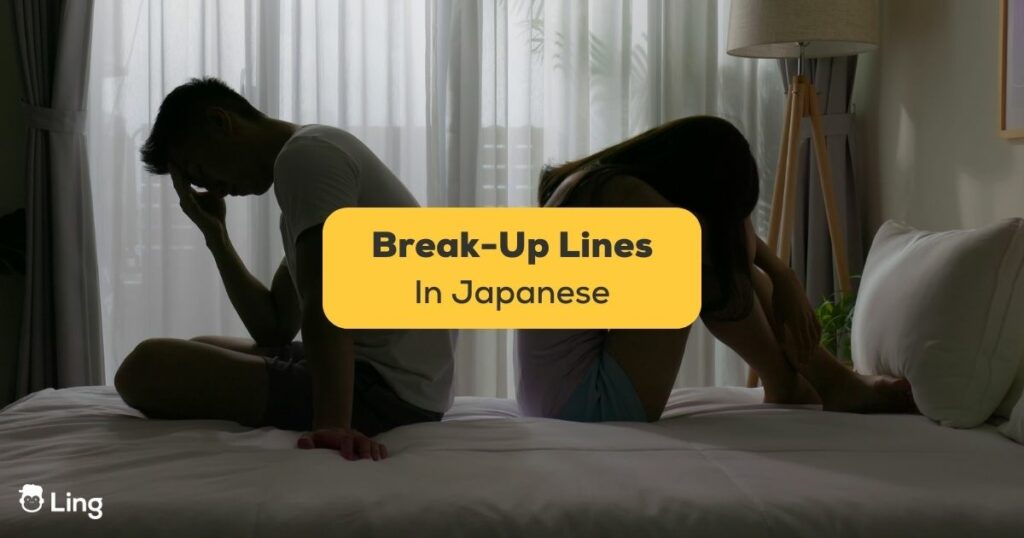Breaking up is never easy, regardless of the language you speak. When it comes to ending a relationship, going beyond a few typical phrases can be challenging.
In this article, we’ll explore the art of breaking up in Japanese, focusing on how to do it with respect and grace. We’ll provide you with a guide on expressing your feelings in a culturally sensitive way. So, let’s learn common break up lines in Japanese and learn how to navigate this delicate terrain.
Break Up The Japanese Way
Before we get down to the business, let’s quickly learn about how relationships and break ups work in the Japanese culture.
Honesty Is Key
In Japanese culture, honesty is highly valued, and this extends to relationships. When contemplating a breakup, it’s essential to be straightforward and express your feelings sincerely. This reflects respect for the other person.

Be Polite & Respectful
The Japanese language is rich in honorifics and polite expressions. When ending a relationship, it’s vital to use respectful language to soften the blow. This demonstrates maturity and empathy.
Express Gratitude
In Japanese culture, expressing gratitude is essential. Even in the face of a breakup, thanking the person for the time spent together and the memories created is a sign of appreciation.
If You Still Care For Them
If you want to end your relationship with mutual understanding, you should use soft break-up phrases. It is always good to start out with “I have something to talk about.” 話があるんだけど ( Hanashi ga aru-n-da kedo). Then, you can say these phrases to your soon ex-to-be.
| English | Japanese | Romaji |
|---|---|---|
| I’m sorry, I can’t date you anymore. | ごめんね。これ以上、お付き合いすることができない。 | Gomenne. Kore ijou otsukiai suru koto ga dekinai. |
| It’s not you. It’s me. | あなたのせいじゃない。私のせい。 | Anata no sei jyanai. Watashi no sei. |
| I don’t think I’m good enough for you. | 私はあなたにふさわしくないと思う。 | Watashi wa anata ni fusawashikunai to omou. |
| I think there’s someone better for you. | あなたにはもっといい人がいると思う。 | Anata ni wa motto ii hito ga iru to omou. |
| Thank you for the time we’ve spent together. | 今までありがとう。 | Ima made arigato. |
| Dating you was fun! But let’s call it off. | 付き合ってて楽しかったよ。けど、もう終わりにしよう! | Tsukiattete tanoshikatta yo. Kedo mou owari ni shiyo! |
| I’m sorry I couldn’t make you happy. | 幸せにすることができなくてごめんね。 | Shiawase ni suru koto ga dekinakute gomenne. |
| It’s hard to break up and I can’t be more grateful to you for the time we spent together. | 別れは辛いけど、感謝してもしきれないよ。 | Wakare wa tsurai kedo, kansha shitemo shikirenai yo. |
If You Feel Like It’s Over But Can’t Be Sure
Sometimes there is no serious reason other than a hunch to break up. You just feel that it’s not going the way you expected and you don’t imagine a future together. At those times, you give a break to protect yourself and even your ex from an unhappy relationship.
| English | Japanese | Romaji |
|---|---|---|
| I realize that we’ve grown apart. | こんなに離れてしまっていたんだね。 | Konna ni hanareteshimatteitan dane. |
| Let’s just be friends. | 友達のままでいよう。 | Tomodachi no mama de iyo. |
| I think we need a break. | 距離を置いた方がいいと思う。 | Kyori o oita hou ga ii to omou. |
| I don’t think we’re right for each other. | 相性が良くないと思う。 | Aishou ga yokunai to omou. |
| I need my space for a while. | しばらく一人になりたい。 | Shibaraku hitori ni naritai. |
| You don’t care about me. | あなたに大事にされてない。 | Anata ni daiji ni sareteinai. |

If You Have Had Enough
Some people are not meant to be together. If you think your partner doesn’t care about you and show you affection like they used to do. Then it’s time to cut ties because it’s a dead relationship.
| English | Japanese | Romaji |
|---|---|---|
| Whatever. Do whatever you want. | もういい。好きにして。 | Mou ii. Suki ni shite. |
| I never want to see you again. | (あなたには)二度と会いたくない。 | (Anata ni wa) ni do to aitakunai. |
| My feelings for you have grown cold. | 気持ちが冷めてしまった。 | Kimochi ga sameteshimatta. |
| I’ve fallen in love with someone else. | 他に好きな人が出来た。 | Hokani suki na hito ga dekita. |
| We should start seeing other people. | お互い、他の人を探すべきだと思う。 | Otagai, hokano hito o sagasubeki da to omou. |
| I can’t picture us having a future together. | あなたとの将来が考えられない。 | Anata to no shourai ga kangaerarenai. |
| I started feeling as if I can’t foresee any future with you. | あなたとはこれからやっていけないと思うようになった。 | Anata to wa korekara yatteikenai to omou you ni natta. |
FAQs: Break Up Culture In Japan
Is it common to remain friends after a breakup in Japanese culture?
Yes, it’s not unusual for people to try and maintain a friendly connection even after a breakup. It depends on the individuals involved.
Are there specific phrases to use when breaking up with a romantic partner vs a friend in Japanese?
While the core principles of honesty and respect remain the same, the choice of words may vary depending on the relationship.
How do Japanese people cope with the emotional aftermath of a breakup?
Coping mechanisms vary from person to person, but many seek support from friends, family, or even professional counselors depending upon their moods and emotions.
Can non-Japanese speakers use these phrases when breaking up with a Japanese person?
Using these break up lines in Japanese can show cultural sensitivity, but it’s essential to explain their meaning if your partner or friend doesn’t speak Japanese.
Is it possible to reconcile after a breakup in Japanese relationships?
Yes, reconciliation is possible in some cases, especially if both parties are willing to work through their issues and communicate effectively.
Conclusion – Break Up Lines in Japanese
It is crucial to handle a break up with grace and respect when breaking up in Japanese culture. Honesty, politeness, and gratitude are key elements of a respectful breakup. Using common breakup phrases can help convey your feelings effectively. Remember that emotions are part of the process, and embracing change is a step toward personal growth.
Start Learning Japanese With Ling!
Say goodbye to language barriers and start learning Japanese with Ling! Get ready to embark on an exciting language learning journey that will make you say “arigatou” in the end.
With Ling, you can start speaking conversational Japanese quickly as a beginner or a seasoned language enthusiast. Imagine not needing subtitles and translations while in Japan! Most Japanese learners chose the Ling app for their language journey, so why not join them?
Download Ling from App Store or Google Play Store today, and choose subscription options to access the entire course!



































































